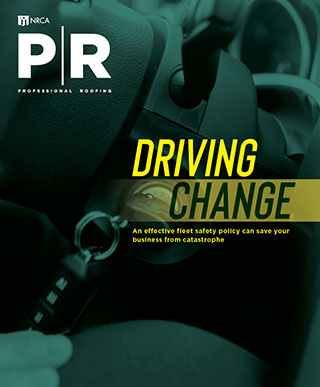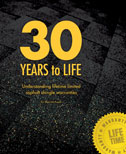In November 2010, I was honored to be elected the representative for Wisconsin's 8th congressional district. The decision to run, campaign and ensuing win have been extraordinary experiences for a regular roofing contractor, and I want to share my story. I hope you find it interesting and informative, and, most of all, I hope it encourages you to get involved and make a difference.
The decision
During winter 2008, the U.S. was entangled in a global economic crisis. The November 2008 elections gave almost unprecedented power to the Democratic Party's most left-leaning factions, and, of all things, Al Franken was elected to the U.S. Senate. I was concerned, and I voiced my concerns to my family.
My oldest son, Clint, challenged me. He said if I was so concerned with our country's future, maybe I should stop complaining and do something about it. So I did. After several months of conversations with my family, especially my wife, DeaNa, we agreed I should at least investigate the possibility of running for Congress.
Having never even run for class president before, the process of running for Congress seemed daunting to me. Where does one begin to raise millions of dollars and assemble a team, and how does one translate his or her passion for policy into a real campaign operation?
I started by seeking counsel from close friends. My first call was to NRCA Executive Vice President Bill Good. Bill and I became close during my time in NRCA's leadership, and I value his counsel and candor.
Bill and I met for dinner and discussed my idea of running for Congress. I wanted his opinion regarding whether he thought I actually could win and whether he believed I was qualified.
Bill was honest. He encouraged a continued investigation and said he believed I could win if I was willing to put in the massive amount of time required. Bill also said based on his interactions with other members of Congress, he saw no reason why I wasn't qualified to be there, as well. I knew that was a knock on either my intelligence or Congress' in general, but I took it as an underhanded compliment and decided to press forward.
Calls to other NRCA friends followed. We discussed the district; potential fundraising difficulties given that I had no experience; and rigors of campaigning while still running my roofing company in Kaukauna, Wis. Even with all the obstacles, my friends encouraged me to run. Many of my contacts became genuinely excited at the prospect and called me countless times during the next year to discuss the race and find out how I was doing.
Finally, I talked with my nephew Troy Ribble. If I was going to move forward with the campaign, I needed to know his thoughts about either running the company while I was gone or buying the company. I was convinced he was ready to take over the company, and he expressed an interest in doing so.
With many of my personal "ducks in a row," the next step was a weeklong trip to Washington, D.C., to feel things out and gain perspective regarding my potential race.
During that week, I met with members of Congress, consultants and the National Republican Congressional Committee staff. Each step of the way, I was encouraged to run. The biggest concern cited was fundraising, which came up in every meeting. It was discussed so often I began to question the process itself. If the campaign was only about money, I'd lose. My Democratic opponent, an incumbent and former doctor, had sold his allergy practice for millions of dollars and could self-fund his campaign if he chose.
No matter how much money I could foresee raising, my opponent always would have more. He also had the built-in advantage incumbent members of Congress possess with name identification and political action committee support.
I returned home to Wisconsin, and DeaNa and I had another heart-to-heart conversation. She is my most trusted confidante. She knows my strengths and weaknesses better than anyone, and I needed to hear her thoughts, fears and concerns. We talked late into the night and finally came to the conclusion I would file papers with the Federal Election Commission.
I soon discovered the huge difference between talking about a campaign and running one. The media starts watching and so do voters. Every move I made became public. It was a giant emotional leap of faith.
The primary
My earliest memory upon entering the race was reading a letter to the editor of Appleton, Wis.'s Post Crescent newspaper. The letter said some disparaging things about me, and I thought: "Wow, I've been in this race for three days and already am getting attacked."
It wouldn't be the last time during the next 18 months I'd be attacked, but it was a nice welcome to politics nonetheless.
After choosing a political consultant, we began to establish a strategy for the primary and general elections. I was encouraged by my team because there was not a single occasion when anyone tried to change me or my positions. No one asked me to lie or stretch the truth or attempted to make me into someone I wasn't. They simply took me as I was and helped shape my message.
I spent many hours at night writing my positions on various topics. Most candidates keep their written comments on positions brief and do not tell anyone much of anything; I hate that approach and refused to do it. From the beginning, I had decided if any constituent asked me a question, I would give him or her a pointed, direct answer without regard to political fallout. Constituents loved it; my consultant, not so much. There was to be no running from what I believed. In the end, this worked to my advantage because no one ever could accuse me of hiding from an issue.
The early campaign had its ups and downs. There were events, parades, meetings and forums. In a race where your name is on the ballot, I learned quickly everything seems much bigger to you than to the average observer. Things I thought would change the election went unnoticed by casual voters. Although it was early in the campaign, I felt like a seasoned veteran, but I soon would learn how quickly campaigns can change.
In October 2009, I was contacted by a tea party group. It wanted to hold a debate with the three declared Republican candidates. I was nervous but tried to remember what my consultant often told me:
"No one wins debates; they only can lose them."
Within days of the debate, three more candidates announced for the seat. All these folks presented interesting challenges, and we had a spirited primary.
As we moved forward, it became abundantly clear to me fundraising was the primary item the media followed. I was frustrated by that benchmark. I wondered why it couldn't be about issues and ideas rather than money. But money is an indicator of support; if someone invests in your campaign—even a small amount—they've invested in you.
My consultants relentlessly kept the pressure on to raise more money. I hated it. I'm a guy who contributes to causes and soon found out it's much easier to give than ask; yet without solid fundraising, I couldn't win. So every day, I picked up the telephone and dialed for dollars. It was hard, tiring and, occasionally, depressing work.
Through numerous circumstances, most notably a group of doctors deciding to endorse and support my candidacy, I began to pick up solid fundraising momentum, and as hard work began to pay off, things fell our way.
But it wasn't a slam dunk by any stretch. I think I experienced more wacky events during 18 months campaigning than I had in 30 years of owning a roofing business.
For starters, one of my campaign employees hit a deer in the middle of the night as we were traveling in Wisconsin's North Woods for an event.
Ultimately, I drove more than 65,000 miles in nine months. My car was in two accidents, neither of which were deemed my fault, but when you're driving hundreds of miles every week, eventually the odds catch up to you.
I had Democratic operatives and "video trackers" constantly following me around. They would stick cameras in my face and try to get a bad reaction or drive by my home early in the morning to see whether I was doing anything wrong. The entire campaign became a test of patience. The better we did, the more abuse we took.
The next three months were a whirlwind. I scrambled across the district working seven days a week. I went to homes, walked in parades, shook hands in restaurants and spoke to anyone who would listen. As my polling numbers went up, my opponents became more aggressive. Although the primary never got too ugly, all candidates did their best to discredit me.
Sept. 14, 2010, was Wisconsin's primary day. It was one of the last primaries in the country and left only seven weeks for the winner to campaign before the general election. When the results were totaled, I had won with 48 percent of the vote in a four-way primary. The win was huge and enabled me to pull conservatives together for the seven-week sprint to the general election.
The general election
The day after the primary, Wednesday, Sept. 15, 2010, I awoke to a barrage of negative TV ads. The ads were paid for by labor unions, my Democratic opponent and the Democratic Congressional Campaign Committee.
For the next seven weeks, dozens of times each day, TV audiences saw me in the most negative light anyone could possibly paint. The strategy was to discredit my roofing company by implying I had hired illegal immigrants. The ads consistently distorted my positions on Social Security, Medicare, taxes and virtually anything my opponents could find. What surprised me most about this was that no attempt was made to present my actual positions. In fact, the entire goal was to twist my words to make me seem like a monster.
There were times during the general election when I wondered whether anyone would vote for me, including my wife, DeaNa. I'd come home at night from a long day of campaigning, and she'd tease me about what she saw on TV.
"Reid, I didn't know you hate children and want to take money away from old ladies!" she'd say.
Obviously, those things aren't true, but that's how negative the campaign had become. It had degenerated into simple insults backed by millions of dollars from labor unions.
During the final seven weeks, most of my time was spent trying to raise enough money to fight back. We realized we couldn't sustain the level of hits we were taking without responding to them.
I was being outspent nearly 3 to 1, and each day, I felt more pressure to raise money to defend myself. I needed to raise at least $100,000 each week of the general election. It was the most tiring and stressful seven weeks of my life.
Earlier in the campaign, I had placed a photo of my two grandchildren on my refrigerator to remind myself why I was putting our family through this ordeal. I discovered a wonderful truth along the way: I love my grandchildren more than I hated the process, stress and attacks against me.
Finally, with only 12 days left in the campaign, my team and I decided we needed a game changer. We took a novel approach—instead of all the grainy images, moving graphics and ominous-sounding ads barraging our TV sets, we cut a TV ad where I sat on my couch in my home and simply talked directly to voters.
In that advertisement, I said: "Sick of all the negative TV ads? Me, too. I am a businessman. I have spent my entire life attacking problems—not people. So please join me on Nov. 2, and together, we can clean house in Washington."
With the words "attacking problems, not people," we finished the campaign's ads. I didn't know whether we would win, but I knew talking directly to voters from my heart was the right thing to do.
The first day the ad ran, my telephone would not stop ringing. Calls were coming in from everywhere; we had struck a nerve with voters. They, too, were tired of the negative TV ads, and many swung to our camp based on that message.
The grueling seven-day workweeks were about to end. I was confident in the work we had done and completely relaxed because, win or lose, it was going to be over soon.
Friends from the roofing industry helped during the last few days of the campaign. It was an honor to have their support. Finally, at about 9 p.m. on election night, the race was called, and I was able to go on stage and claim victory. I was humbled to tell everyone in attendance we had won with 55 percent of the vote. I picked up my grandson Joseff to give him a hug, and it was caught on camera. That photograph was on the front page of the newspaper the next morning and hangs in my office in Washington, D.C.
I spoke of my grandchildren a lot during my campaign. I was and continue to be concerned about their futures. I would ask audiences each day whether they believed the opportunities their children and grandchildren were going to have were better than what they had experienced. It was rare anyone would say they thought the opportunities were better. People were sensing what I knew was true. I knew if I only could show them my sincerity in my reasons for being a candidate and my vision for not just my grandchildren but theirs, as well, I could make a difference.
Reid Ribble is the U.S. representative for Wisconsin's 8th Congressional District. He was NRCA president from 2005-06.



